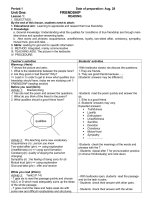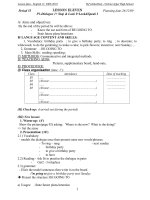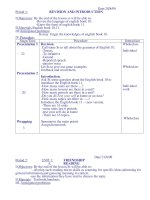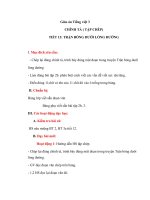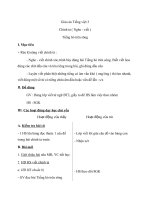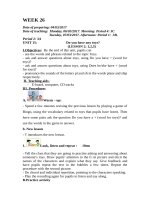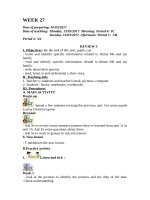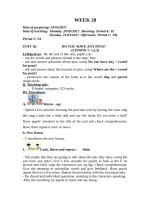giao an TA 11 ( 3 year) Tran M Tue ( 0977530231
Bạn đang xem bản rút gọn của tài liệu. Xem và tải ngay bản đầy đủ của tài liệu tại đây (288.79 KB, 48 trang )
Lesson plan - English 11/ 2009-2010 - ByVuDucDien - NaTau Upper High School
Period 55
Lesson eleven
P1-Dialogue 1+ Stop & Look I+Look&Speak I
Planning date:26/12/09
A/ Aims and objectives:
By the end of the period Ss will be able to:
- Know the use and form of BE GOING TO
- State future plans/intentions
B/ LANGUAGE CONTENT AND SKILLS:
1, Vocabulary: birthday party ; to give a birthday party; to ring ; to decorate; to whitewash;
to do the gardening; to make a cake; to pick flowers; tomorrow; next Sunday;…
2, Grammar: - BE GOING TO
3. Main Skills: reading; speaking;
C/ Methods: Communicative and integrated methods.
d/ Teaching aids:
Pictures, supplementary board, hand-outs,
e/ Procedure:
(I) Class organisation (time: 1’):
Class Attendance Date of teaching
B1
B3
B4
B5
...... (Absent:...............................................................)
...... (Absent:...............................................................)
...... (Absent:...............................................................)
...... (Absent:...............................................................)
..........................
..........................
..........................
........................
(II) Check-up: (carried out during the period)
(III) New lesson:
1. Warm-up: (4')
Show the picture(page 92) asking: Where is she now? What is she doing?
=> Set the scine
2. Presentation: (16')
2.1) Vocabulary:
- models the dialogue once then present some new words/phrases:
- To ring – rang
- birthday party
- to give a birthday party
- to have
- next sunday
2.2) Reading:- Ask Ss to practise the dialogue in pairs
- Get2 –3 roleplays
2.3) grammar:
- Elicit the model sentences then write it on the board
I’m going to give a birthday party next Sunday.
Present the structure: BE GOING TO
a) Usages: -State future plans/intention
-Usually used with these adverbs of time: this afternoon; tonight; tomorrow; next
b) Form: (+) S + am/is/are going to + V
infinitive
1
Lesson plan - English 11/ 2009-2010 - ByVuDucDien - NaTau Upper High School
( I -->am ; we/you/they/Plural N -->are ; He/she/sing.N-->is)
(-) S +am/is/are +not + going to +V….
(?) Am/Is/Are +S +going to +V…?
c) Comprehension check: Choose the best answer:
1. He is going to ……………an exam next Monday. (to take /take/ takes/taking)
2. They…………going………..soccer this afternoon
(are/take ; are/to take ; is/take ; are/taking)
3. We are ………………a new car. (go to buy / going buy /going to buy)
4. What …………………….tonight?
(is she going do / she is going to buy /is she going to buy /she going to buy)
3. Practice: (Look & speak I) (15’)
Explain the new words: to clean the house
to decorate;
to whitewash;
to do the gardening;
to make a cake;
to pick flowers;
*Practice 1: Ask Ss to make positive sentences to state what the people in the pictures are
going to do
eg. She’s going to clean the house
They are going to………………
He;s going to……………………..
* Practice 2: Ask Ss to make negative sentences to state what the people in the pictures
aren’t going to do
eg. She isn’t going to do the gardening.
4. Further practice: (6’)
Ask Ss to make sentences about themselves using these prompts:
- water the flowers
- do my homework
- play soccer
- go shopping
- go to the cinema
- take a exam
- buy a new bike
- visit my grand mother in Hanoi.
Eg. I’m going to water the flowers this afternoon
5. Summary: (2’) Summarize the content of the period ( BE GOING TO)
6. Homework: (1’) - Write sentences in look & speak I
- prepare ASK AND ANSWER I
--------------------------------------------------------------------------------
Ngày……tháng 12 năm 2009
Period 56
Lesson eleven
Planning date:27/12/09
2
Lesson plan - English 11/ 2009-2010 - ByVuDucDien - NaTau Upper High School
P2- ASK and ANSWER I + Further Exercises
A/ AIMS :
By the end of the period Ss will be able to:
- make questions and answers with BE GOING TO
- State future plans/intentions
B/ LANGUAGE CONTENT AND SKILLS:
1, Vocabulary: words and phrases as those in period 55 ;
to have a shower; to have breakfast; to prepare a help;
2, Grammar: - BE GOING TO
3. Main Skills: speaking; writing
C/ Methods: Communicative and integrated methods.
d/ Teaching aids:
Pictures, supplementary board, hand-outs,
e/ Procedure:
(I) Class organisation (time: 1’):
Class Attendance Date of teaching
B1
B3
B4
B5
...... (Absent:...............................................................)
...... (Absent:...............................................................)
...... (Absent:...............................................................)
...... (Absent:...............................................................)
..........................
..........................
..........................
........................
(II) Check-up: (4’)
? Make 4 sentences about your plan for tomorrow.
(III) New lesson:
1. Review: (5') BE GOING TO
Elicit the structures and write them on the board
(+) S + am/is/are going to + V
infinitive
( I -->am ; we/you/they/Plural N -->are ; He/she/sing.N-->is)
(-) S +am/is/are +not + going to +V….
(?) Am/Is/Are +S +going to +V…?
2. Practice: (25’)
a) Practice 1: Ask Ss to ask and answer using the words given in LOOK and SPEAK I
Eg.1: S1: Is she going to clean the house?
S2: Yes, she is.
Eg2: S1: Is she going to do the gardening?
S2: No, she isn’t.
Eg3: S1: Are they going to…………………..?
S2: Yes, they are.
b) Practice 2:
Explain the new words/phrases: to have a shower; to have breakfast; to prepare the party
Ask Ss to ask and answer about John:
Eg. Is he going to clean the house?
3
Lesson plan - English 11/ 2009-2010 - ByVuDucDien - NaTau Upper High School
Yes, he is
Is he going to decorate the room?
Is he going to prepare the party?
c) Practice 3: Ss ask and answer about themselves:
Eg. S1: What are you going to do tonight/tomorrow/next Sunday/…?
S2: I’m /we are going to……………..
3. Further Exercises: (7’) (hand-outs)
Choose the best answer:
1, My father is going………….a motorbike. (to buy/ buy /buying/bought)
2, ………..they going to………..the room?
(Are/ decorating ; Are/decorate ; Did /decorate ; Do/ decorate)
3, We’re ………………… fishing this afternoon.
(going to go / went to go / going go / going to went)
4, He ……………..going to see the football match on TV tonight.
( aren’t / didn’t / isn’t / don’t)
5, I…………. went to the cinema last Saturday evening.
( wasn’t / didn’t / couldn’t / don’t)
6, Where………………………… your holiday?
(you are going to spend / are you going to spend /
are you going spend / do you going to spend)
4. Summary: (2’) Summarize the content of the period ( BE GOING TO)
5. Homework: (1’) - Ex 1.a
- Prepare dialogue 2 + Look and speak II
--------------------------------------------------------------------------------
Ngày……tháng 12 năm 2009
4
Lesson plan - English 11/ 2009-2010 - ByVuDucDien - NaTau Upper High School
Period 57
Lesson eleven
P3-Dialogue 2+ Stop & Look II+Look&Speak II
Planning date:28/12/09
A/ AIMS:
By the end of the period Ss will be able to:
- Know the use and form of the present simple tense of HAVE TO
- State obligation
B/ LANGUAGE CONTENT AND SKILLS:
1, Vocabulary: candle; middle; guest; corner; to push; to move; to make room for;
to be ready; to have to; to take…away.
2, Grammar: - Present simple of “Have to” (obligation)
3. Main Skills: reading; speaking;
C/ Methods: Communicative and integrated methods.
d/ Teaching aids:
Pictures, supplementary board, hand-outs,
e/ Procedure:
(I) Class organisation (time: 1’):
Class Attendance Date of teaching
B1
B3
B4
B5
...... (Absent:...............................................................)
...... (Absent:...............................................................)
...... (Absent:...............................................................)
...... (Absent:...............................................................)
..........................
..........................
..........................
........................
(II) Check-up: (carried out during the period)
(III) New lesson:
1. Warm-up: (4')
- Show the picture (page 93) asking:
Where are they? What are they doing? Are they going to give a birthday party?
=> Set the scine “ John and his mother are preparing a birthday party…”
2. Presentation: (15’)
2.1) Vocabulary:
- Model the dialogue once and present the new words /phrases
-Candle (n)
-Middle (n)
-Guest (n)
-Coner (n)
-to push
-to move;
-to make room for;
-to be ready;
-to have to + V
inf.
-to take…away.
- Ss learn and copy the new words
2.2) Reading:
- ask Ss to play the roles of John and his mother
- Get2-3 roleplays
2.3) Grammar: Ordinary verb “HAVE TO”
? Find sentences in the dialogue with HAVE TO
I have to push…… I have to move….
You have to take…. We have to be quick
? Do you know the meaning of these sentences?
? What part of speech follows HAVE TO? (V
inf.
)
5
Lesson plan - English 11/ 2009-2010 - ByVuDucDien - NaTau Upper High School
Present the structure with HAVE TO
a) Usage: to state obligation (have to = Must )
b) Form:
Ask Ss to look at Stop &Y Look II then explain:
* Positive:
S + HAVE TO + V
inf.
….
S
third sing.
+HAS TO +V
inf…
…..
* Negative:
S + don’t HAVE TO + V
inf.
….
S
third sing.
+doesn’t HAVE TO +V
inf…
…..
*Interrogative:
Do + S + HAVE TO + V
inf.
……?
Does +S
third sing.
+HAVE TO +V
inf…
…..?
3. Practice: (look and speak II) (14’)
a) Practice 1:
- Help ss read the new words: revise ; walk ; look after
- Ask Ss to make sentences to state what Hanh has to do everyday.
(using pictures and the words given)
Eg. She has to get up at 5 to revise her lessons.
- get some Ss to make sentences
b) Practice 2: - Ask Ss to make negative sentences about Hanh
(Hanh doesn’t have to do the activities above)
eg. She doesn’t have to get up at 5 to revise her lessons
cook dinner.
c) Practice 3: Ask Ss to talk about themselves using the following promts:
- clean the house
- water the flowers
- wash the clothes
- do my homework
- prepare the lesson before coming to class
- look after my little brother/sister
- cook dinner
- feed the chickens
Eg. I have to clean the house everyday.
We have to do our homework every day
4. Further practice: (6’) (hand-outs)
Choose the best answer:
1, My sister………… her homework everyday.
(has to doing / haves to do / has to do / has to did )
2, ……………she have to do the gardening? ( do/does / was / is )
3, What ………………………..in the afternoon?
(does you have to do / you have to do / do you have to doing / do you have to do)
4, They …………….go to work on Sundays.
(don’t have to / aren’t have to / haven’t to / didn’t have )
5. Summary: (2’) Summarize the content of the period (Have to (obligation))
6. Homework: (1’) – Write sentences about Hanh
- Ex 1 .b
- prepare ASK AND ANSWER II
Ngày……tháng 12 năm 2009
6
Lesson plan - English 11/ 2009-2010 - ByVuDucDien - NaTau Upper High School
Period 58
Lesson eleven
P4- ASK and ANSWER II+ Further exercises
Planning date:31/12/09
A/ AIMS:
By the end of the period Ss will be able to: use “Have to ” to talk about obligation
B/ LANGUAGE CONTENT AND SKILLS:
1, Vocabulary: look after; hand in ; clearly; ;…
2, Grammar: - Present simple of “Have to” (cont.)
3. Main Skills: reading; speaking; writing
C/ METHODS: Communicative and integrated methods.
D/ TEACHING AIDS:
Pictures, supplementary board, hand-outs,
E/ PROCEDURE:
(I) Class organisation (time: 1’):
Class Attendance Date of teaching
B1
B3
B4
B5
...... (Absent:...............................................................)
...... (Absent:...............................................................)
...... (Absent:...............................................................)
...... (Absent:...............................................................)
..........................
..........................
..........................
........................
(II) Check-up: (carried out during the period)
(III) New lesson:
1. Warm-up: (3')
- Ask Ss to work in pairs to complete the table about themselves
What do you have to do everyday? Time
- Do my homework 4.am
2. Practice: ( Ask and Answer II)
2.1) Practice 1: SS ask and answer in pairs using the information in the warm-up:
Model 1: S1: What do you have to do at ……….?
S2: I have to …………….
eg. S1: What do you have to do at 6.am?
S2: I have to prepare breakfast.
Model 2: S1: Do you have to ……………... at ……….?
S2: Yes, I do / No, I don’t.
Eg. S1: Do you have to cook dinner at 5.pm?
S2: Yes, I do
2.2) Practice 2: SS ask and answer in pairs about Hanh using the information in the
book.
Model: S1: Does she have to ………………..?
S2: Yes, she does.
7
Lesson plan - English 11/ 2009-2010 - ByVuDucDien - NaTau Upper High School
Eg. S1: Does she have to read the questions carefully?
S2: Yes, she does.
3. Further exercises:
Ex1: Choose the best answer:
1, Mai …………… the flowers every morning.
(have to water/has to water/has to watering / has to watered)
2, He ……………..get up at 5.am on Sundays.
(not have to / don’t have to / doesn’t have to/ doesn’t has to)
3, ………… Tuan ………….start work at 7.am?
(Do-have to /Are-have to / Does – have to / Is –has to)
4, We…………..do the gardening at 4.pm.
(not have to / don’t have to / doesn’t have to/ doesn’t has to)
Ex2: Complete these sentences from the the words given:
1, my father/ have to / work / 5 days a week//.
2, Mr Lam /not / have to / cook dinner//.
3, your sister / have to / do / homework /everyday?
4, What / Lan / have to / do / 2.pm //?
4. Summary: (1’)Summarize the content of the period
5.Homework: (1’)
– Write questions and answers for the Ask and Answer II
– Ex 2,3,4
--------------------------------------------------------------------------------
Ngày……tháng 01 năm 2010
8
Lesson plan - English 11/ 2009-2010 - ByVuDucDien - NaTau Upper High School
Period 59
Lesson eleven
P5- Home work + Further exercises
Planning date:3/1/2010
A/ AIMS:
By the end of the period Ss will be able to:
B/ LANGUAGE CONTENT AND SKILLS:
1, Vocabulary:
2, Grammar Review : - Be going to
- Present simple of “Have to”
3. Main Skills: reading; speaking; writing
C/ METHODS: Communicative and integrated methods.
D/ TEACHING AIDS:
Pictures, supplementary board, hand-outs,
E/ PROCEDURE:
(I) Class organisation (time: 1’):
Class Attendance Date of teaching
B1
B3
B4
B5
...... (Absent:...............................................................)
...... (Absent:...............................................................)
...... (Absent:...............................................................)
...... (Absent:...............................................................)
..........................
..........................
..........................
........................
(II) Check-up: (carried out during the period)
(III) New lesson:
1. Grammar Review: “Be going to” and “Have to” (6')
Be going to Have to
Positive: S + am/is/are going to + V
inf.
S + have to/has to + V
inf.
Negative: S + am/is/are +not+going to +V
inf.
S+don’t/doesn’t+have to +V
inf.
Interrogative: Am/Is/Are +S+going to+V
inf…
.? Do/Does+S+have to+V
inf
….?
Usages: Stating plan, intention Stating obligation
2. Exercises: (22’)
Ex 2)
- Ask Ss to work in pairs to complete the dialogue (3’)
- Go through the answers
- Ss practice the dialogue in pairs
*Note: Suggestion “What about going ……………..?”
Ex 3)
- Explain some new words/phrases:
+ tomorrow
+ the day after tomorrow
+ It’s about 70 km away.
+ to come back
+ to get sth ready
- Ss read the passage then answer the questions.
- Get some ss to give the answers
- Feedback and correction
• Answer keys: 1, yes, she is.
9
Lesson plan - English 11/ 2009-2010 - ByVuDucDien - NaTau Upper High School
2, She’s going to walk to school with her friends
3, They’re going to visit the beach
4, Yes, she does
5, Free answers ( she also has to get food, drink,…)
* Notes: The transformation of pronouns: I she; my her; we they
Ex 4)
- Give prompts in English then ask SS to complete the sentences
1, I / going / see/ “NổI Gió”/ with my friends //.
2, They / going / learn / lesson 12 //.
3, Lan / going / swim //.
4, He / have to / see the doctor / this afternoon //.
5, What / you / have to / do / this afternoon //? We / have to /go / airport //.
* Note: When “Be going to” is followed by the verb “go”, “to go” can be omitted.
Eg.1 She is going (to go) fishing this afternoon.
Eg. 2 I’m going (to go) to Hanoi next Sunday.
3. Further exercises: (12’)
Complete these sentences from the words given:
1, We / not / going / play soccer / this afternoon//.
2, My father /going / Hanoi / tomorrow//.
3, What / she / going / do / next Saturday //?
4, Mai / going / do the gardening / tomorrow afternonn//?
5, Mrs Hoa / have to / do the house work / every day//.
6, You / have to / cook dinner /everyday//?
7, He / not / have to / do the washing / everyday//.
8, What / Tan / often / have to /do / Sundays//?
4. Summary: (2’)Summarize the content of lesson 11. ( be going to / have to)
5. Homework: (1’)
Prepare lesson 12
--------------------------------------------------------------------------------
Ngày……tháng 01 năm 2010
10
Lesson plan - English 11/ 2009-2010 - ByVuDucDien - NaTau Upper High School
Period 60
Lesson TWELVE
P1-Dialogue 1+ Stop & Look I + Look&Speak I
Planning date: 4/01/10
A/ AIMS:
By the end of the period Ss will be able to:
- Know the use of IF in complex sentences.
- Make sentences with IF to give advice
B/ LANGUAGE CONTENT AND SKILLS:
1, Vocabulary: to feel tired ; to feel better; to feel worse; to hurt all over ; to stay in bed;
to hold; to sit up; to go on doing sth.; to take some pills; to get well ;
to press the button;
2, Grammar: - conjunction “IF” ; Complex Sentences with IF
( If……………………will……….)
3. Main Skills: reading; speaking;
C/ METHODS: Grammar translation.
D/ TEACHING AIDS: Pictures,
E/ PROCEDURE:
(I) Class organisation (time: 1’):
Class Attendance Date of teaching
B1
B3
B4
B5
...... (Absent:...............................................................)
...... (Absent:...............................................................)
...... (Absent:...............................................................)
...... (Absent:...............................................................)
..........................
..........................
..........................
........................
(II) Check-up: (carried out during the period)
(III) New lesson:
1. Warm-up: (4')
- Show the picture (page 99) asking:
Where are they ? Who are they ? what is the matter with the man?
==> - Set the scine “ MrB is ill. He is now in the hospital.The nurse is talking with him. ….”
2. Presetation:(20’)
2.1) Vocabulary:
- model the dialogue once then explain the new words/phrases:
- Ss learn and copy the new words
+ to feel tired
+ to feel better
+ to feel worse
+ to hurt all over
+ to sit up
+ to stay in bed too much
+ to walk round
+ to go on = to continue
+ If : Nếu
+ will : sẽ
• what and where voc.
2.2) Reading:
- Ask Ss to practice the dialogue in roles (2’)
- Get 2-3 roleplays
2.3) Grammar:
- Ask Ss to find sentences with IF and translate them into Vietnamese
You’ll feel better if you get up and walk round a little.
(main clause) (if-clause)
=> Present the new structure: Complex sentences with If- clause
11
Lesson plan - English 11/ 2009-2010 - ByVuDucDien - NaTau Upper High School
- Explain: A complex sentence is a sentence consisting of a main clause and one or more
subordinate clauses.
In this lesson, the complex sentence consists of a main clause and the If-clause.
? What is the tense of the verb in the If-clause?
? What is the tense of the verb in the main clause?
- Present the form and usages of the structure:
- Ss note down
a) Form:
Main clause If – clause
S
1
+ will (not) +V
inf
…..
(simple future)
(will not = won’t)
If + S
2
+ V
(simple present)
…….
(am/is/are/V
s/es
)
• Note: - The Subjects in the two clauses can be either the same or different.
- The If-clause can either precede or follow the main clause. When the If-
clause is initial, there is a comma after it. ( If……., will……)
b) Usages:
? What is the this kind of sentence used for ?
+ To give advice
+ To state a present real condition
- Ask Ss to see Stop and Look I
3. Practice: (12’) (Look and Speak I) Giving advice
a) Practice 1:
- Explain the new words: to take these pills ; to get well; to press the button; to get better
- Ss look at the pictures (page 101) then play the roles of the nurse and the mother to give
advice.
Model: If you ………………, you’ll ………………
You’ll……………..…if you………………
Eg. If you take these pills, you’ll feel better.
You’ll feel better if you take these pills.
b) Practice 2:
Model: If you don’t………………, you won’t …………………
Eg. If you don’t take these pills you won’t feel better
4.Production: (5’) Complete these sentences from the words given:
1, If /you / not study hard / you / fail the exam //.
2, you / get good marks / if / you / learn harder //.
3, He / get bad marks / if / he / be lazy //.
4, If / it / be / cold / we / not / go swimming //.
5. Summary: (2’) Summarize the content of the period
6. Homework: (1’)
- Learn the new structure;Write advice sentences in Look and Speak I ; Ex 1 (a)
12
Lesson plan - English 11/ 2009-2010 - ByVuDucDien - NaTau Upper High School
Period 61
Lesson TWELVE
P2- ASK AND ANSWER I + Further exercises
Planning date: 10/01/10
A/ AIMS:
By the end of the period Ss will be able to: Know the use of conditional sentences type I and
make conditional sentences.
B/ LANGUAGE CONTENT AND SKILLS:
1, Vocabulary: maternity ward; twins; to have a baby;
2, Grammar: - conditional Sentences type I ( If ……will…….)
3. Main Skills: reading; speaking;
C/ METHODS: Grammar translation.
D/ TEACHING AIDS: Pictures, hand-outs
E/ PROCEDURE:
(I) Class organisation (time: 1’):
Class Attendance Date of teaching
B1
B3
B4
B5
...... (Absent:...............................................................)
...... (Absent:...............................................................)
...... (Absent:...............................................................)
...... (Absent:...............................................................)
..........................
..........................
..........................
........................
(II) Check-up: (carried out during the period)
(III) New lesson:
1. Review: (4') Conditional sentences type I
What is the uses and form of conditional sentences type I ?
Main clause If – clause
S
1
+ will /won’t +V
inf
…..
(simple future)
(will not = won’t)
If + S
2
+ V
(simple present)
…….
(am/is/are/V
s/es
)
2. Practice:
Practice 1:
- Ask Ss to ask and answer about the patient and the child (pictures–Look & Speak I)
Model 1: How will he feel if he takes these pills ?
He will feel better if he takes these pills
Model 2: Will he ………………. if he takes these pills ?
Yes, he will.
- Ss ask and answer in pairs (closed pairs)
Practice 2:
- model the passage once then explain the new words:
+ maternity ward
+ twins
+ to have a baby / to give birth to a baby
- Ask Ss to read the passage then ask and answer in pairs using these questions:
1, what has Chris just done?
2, Is she going to have baby?
13
Lesson plan - English 11/ 2009-2010 - ByVuDucDien - NaTau Upper High School
3, will he be happy if it is a boy? / How will he be if it is a boy?
4, Will he feel happy if it is a girl?/ How will he be if it is a girl?
5, Will he feel happy if she has twins?
3.Further exercises: (hand-outs)
Ex 1: Put the verb in bracket in the correct form:
1, If it is cold , we …………….(not go) swimming.
2, He will fail the exam if he………………..(not study) hard.
3, Will your parents be happy if you………………….(get) good marks?
4, If you are lazy, you…………………..(not pass) the exam.
5, If I ………………(have) enough money, I will buy a new motorbike.
6, I will come if you ……………………(call) me.
Ex 2: Complete these sentences :
1, If it is warm tomorrow,…………………………………………………...
2, If you don’t study hard,……………………………………………………..
3, We won’t play soccer if………………………………………………………
4, She will feel better if……………………………………………………………..
5, If they don’t come,……………………………………………………………..
4. Summary: (2’) Summarize the content of the period
5. Homework: (1’)
- Ex 1 (a)
- Vietnamese- English translation:
1, Nếu mai trờI mưa chúng tôi sẽ ở nhà
2, nếu chúng tôi có thờI gian chúng tôi sẽ đến thăm cậu
-----------------------------------------------------------------------------------------
14
Lesson plan - English 11/ 2009-2010 - ByVuDucDien - NaTau Upper High School
Period 62
Lesson TWELVE
P3-Dialogue 2+ Stop & Look II + Look&Speak II
Planning date: 10/01/10
A/ AIMS:
By the end of the period Ss will be able to:
- Know the use of WHEN in complex sentences.
- Make sentences with conjunction “WHEN”
B/ LANGUAGE CONTENT AND SKILLS:
1, Vocabulary: earphone, program; to happen; to call; to enjoy
2, Grammar: - conjunction “when” ; Complex Sentences with “when”
3. Main Skills: reading; speaking;
C/ METHODS: Grammar translation.
D/ TEACHING AIDS: Pictures,
E/ PROCEDURE:
(I) Class organisation (time: 1’):
Class Attendance Date of teaching
B1
B3
B4
B5
...... (Absent:...............................................................)
...... (Absent:...............................................................)
...... (Absent:...............................................................)
...... (Absent:...............................................................)
..........................
..........................
..........................
........................
(II) Check-up: (carried out during the period)
(III) New lesson:
1. Warm-up: (3')
Do you remember how Mr B feels in the first part of the dialogue?
Does he feel better now?
We ‘re going to study the second part of the dialogue
2. Presetation:(20’)
2.1) Vocabulary:
- model the dialogue once then present the new words/phrases
+ earphone (n)
+ program (n)
+ to happen
+ to call
+ to enjoy yourself
* What and Where voc.
2.2) Reading:
- Ask Ss to practice the dialogue in pairs
- Get 2-3 roleplays
2.3) Grammar:
? Now find sentences with “when”
=> Present the model sentences on the board
What will happen when I press the red button?
The program will stop………
? How many clauses are there in this sentence?
Present the new structure:
Complex sentence with the clause of time “when….”
15
Lesson plan - English 11/ 2009-2010 - ByVuDucDien - NaTau Upper High School
a) Form:
Main clause Time clause
S1 + will +V
inf…
……. when + S2 + V
simple present.
Notes: + S1 can be either the same or different from S2.
+ the time clause can either precede or follow the main clause. When the time
clause is initial, there is a comma after it.
b) Usage: To state an action which will certainly happen in the future.
c) Comprehension check:
Choose the right form of the verb in bracket to complete these sentences:
1, When he ………(come/comes/came/coming), I’ll tell him the truth.
2, I won’t go swimming when it…………(be/is/was) cold.
3, She………….(be/is/will be/was) sad when she knows her exam result
4, I……………(visit/will visit/visited/visiting) you when I have free time.
3. Practice: (Look and Speak II)
Make sentences with the clause of time:“when….”about the people in the picture
- Give prompts and explain
A, He / stay at home / when / it / be wet //.
B, She / go to the beach / when / it / be hot //.
C, they / won’t feel happy /when / match / be over //.
D, She /won’t meet / him / when / she /gets / station //.
- Ss practice making sentences
Model: S +will +
Vinf…
….. when + S + V
simple present
eg. A, He will stay at home when it is wet.
4.Production: Complete these sentences:
1, When summer comes, I………………………………….
2, when summer finishes , I ………………………………….
3, I will come to see you when I……………………………………
4, What will you do when you……………………………………….?
5, when they arrive at the station, they …………………………………………
5. Summary: (2’) Summarize the content of the period
6. Homework: (1’)
Ex 1 (b) ; ex 2
---------------------------------------------------------------------------------
16
Lesson plan - English 11/ 2009-2010 - ByVuDucDien - NaTau Upper High School
Period 63
Lesson TWELVE
P4- ASK AND ANSWER II + Further exercises
Planning date: 11/01/10
A/ AIMS:
By the end of the period Ss will be able to:
+distingwish IF with WHEN
+ make sentences with If and WHEN
B/ LANGUAGE CONTENT AND SKILLS:
1, Vocabulary: dictionary ; go camping; go shopping; have enough money;
2, Grammar review: If ; when
3. Main Skills: reading; speaking; writing
C/ METHODS: Grammar translation.
D/ TEACHING AIDS: Pictures, hand-outs
E/ PROCEDURE:
(I) Class organisation (time: 1’):
Class Attendance Date of teaching
B1
B3
B4
B5
...... (Absent:...............................................................)
...... (Absent:...............................................................)
...... (Absent:...............................................................)
...... (Absent:...............................................................)
..........................
..........................
..........................
........................
(II) Check-up: (carried out during the period)
(III) New lesson:
1. Review: (4')
Complex sentence with the clause of time “when….”
Main clause Time clause
S1 + will +V
inf…
……. when + S2 + V
simple present.
2. Practice:
Practice 1:
- Ask Ss to use the information in Look and Speak II to ask and answer in pairs
Model: Will + S + V
inf…
……when + S + V
simple …
…?
Yes, S + will / No, + S + won’t.
Eg . - Will he stay at home when it is wet? - Yes, he will.
- Ss ask and answer in pairs (closed pairs)
Practice 2:
- Explain the new words/phrases:
dictionary (n); go camping; go shopping ; have enough money.
- Ask ss to read the passage then answer these questions:
a, will Nga stay at home and help her Mum when summer comes?
b, What will Nga do if her friends go camping?
c, What will Nga do when summer finishes?
17
Lesson plan - English 11/ 2009-2010 - ByVuDucDien - NaTau Upper High School
d, Will she buy a Vietnamese-English dictionary if she has enough money?
e, Will she be happy when the new school year begin?
- Get some Ss to give the answers for class correction
(?) What is the difference in usage between IF and WHEN ?
+ If : is used to state a condition
+ When : is used to state a certain action
eg When summer comes……
we can’t say “ if summer comes…”
3.Further exercises:
- Ask Ss to do these ex.
Ex 1: Put the verb in bracket in the correct form:
1, If you study harder, you……………..(get) good marks.
2, When she …………..(come), I will tell her the truth.
3, If you take these pills, you’ll …………(feel) better.
4, He ……………….(go) out to work when he finishes school.
5, What will happen when he …………..(press) the red button?
6, Will I feel better if I ………………(go) out for a walk?
Ex 2: Make sentences about yourself ( 3 sentences with IF ; 3 sentences with WHEN)
4. Summary: (2’) Summarize the content of the period
5.Homework: (1’)
Ex 3,4
---------------------------------------------------------------------------------
18
